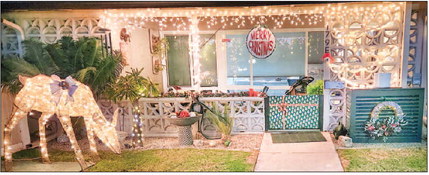LETTERS
from page 4
munity is not noticeably safer or more secure with the electronic gates, nor will it be with the traffic diversion. Changes should be made only when the results or consequences improve the lot of the residents.
Gene Osier Mutual 15 Editor:
It is very irritating not to be able to enter Leisure World and exit Leisure World directly. Having to make U-turns is not only annoying but can be dangerous. As a resident, this is unacceptable. In an emergency, it would take longer and should not be allowed. As a Mutual 15 resident we pay a premium price for living here, and we should, at the very least, have easy access to our homes.
These barricades make no sense. Trying to tell visitors how to get to and from Mutual 15 will be complicated. Please do not put up these barricades!
Mary Guymon Mutual 15 Editor:
I am opposed to the barricades. I feel they negatively impact on residents’ safety by unnecessarily impeding access for emergency vehicles. They also negatively impact property values by making our community seem less welcoming to prospective buyers, as well as very regimented and restrictive.
D. Thackrey Mutual 15 Editor:
What is happening at the front gate? We look like a third world country. This is has got to come to an end. It's embarrassing and non-productive and confusing again! Clean it up and stop with all the barricades.
Have you ever been to Berlin? Its entrance looked better than this. Please tell whomever needs to know that we are against all the barricades and the unprofessionalism when entering our community. Certainly we can do better than this. We are appalled. It keeps getting worse, not better.
Dolorie and Walt Thurner Mutual 15 Editor:
Please don’t put in permanent barricades. Mostly people need to vote on this. Thank you.
Raymonde Adellach Block Mutual 15 Editor:
Scrap the barricade. Let all of LW vote or place a survey in the LW Weekly.
Richard Block Mutual 15 Editor:
One of the things I like best about Leisure World is the diversity of the people living inside our gates. I grew up in Oakland, California, in a neighborhood of all nationalities, religions and customs. I thrived in the environment and brought my child up to be diverse and accepting.
I found it disturbing to know that behind our gates that an individual felt compelled to leave a piece of offensive material on a person’s vehicle because they do not respect their sexual identity.
At retirement age, I believe people should put their ignorance and dislike to better use and find ways of giving back to the community and figure out ways to make this world a better place.
Marianne Bartel Mutual 14 Editor:
I certainly hope that many of our members are writing to have the barricades inside the Main Gate at Del Monte removed. Not only is it very inconvenient but making that U-turn at Burning Tree is not safe because of poor visibility. Many exiting are doing this, which is causing aggravated congestion at the intersection. The other day there were so many cars coming and going in all directions, traffic was at a standstill for several minutes. And I don’t appreciate the lack of explanation for why this is needed in the first place. If it is to deter the few members that don’t follow directions or rules of the road, it is not fair to inconvenience the rest of us. Perhaps installing cameras, then follow up to ticket those drivers. I try to avoid using the Main Gate at all costs, as are many others which only causes more delays at the other gates. Please continue to study this before making any long-term decisions.
Donna Reed Mutual 15 Editor:
As residents of our wonderful retirement community, we cherish the tranquility and mutual respect that define our living environment. For some time, however, some of us have faced a recurring challenge: noise disturbances from shared walls, particularly due to loud television volumes. This issue can be particularly unsettling for those who prefer quieter surroundings. While some may hesitate to speak up, often out of politeness or a desire not to cause discomfort, it is important to remember that open communication and consideration for one another are essential to maintaining our community’s harmony.
Finding a balance where everyone can enjoy their homes peacefully is a goal we can achieve together. Let us renew our commitment to respectful living and seek solutions that benefit all residents.
Edward Hickman Mutual 3 Editor:
Several times, residents have told me I can’t ride my bike on sidewalks. I now carry articles printed in the LW Weekly to show them how ignorant they are of community policies. GRF policy allows bicycles on sidewalks, and here are some observances that would make sharing the road easier.
Pedestrians often walk with their heads down in their own worlds and do not realize a bicycle is approaching them even if it’s only 10 feet away.
Pedestrians tend to walk down the middle of the sidewalks and have no clue a bicycle is coming in either direction. On more than one occasion, I have physically stopped on a sidewalk and had people walk into me.
Saying “passing on your left” out loud is not understood by 80% of the people who walk, and there is rarely room to pass.
Ringing my bell or speaking loud enough to alert pedestrians to my presence mostly causes them to jump, stop dead or act like they’ve had a heart attack. So, I no longer do that but now find another path around them.
Individuals with dogs do not adhere to the 6-foot lease policy. Numerous times I have run over a 24-foot leash when a dog ran across my path. Additionally, when I’m on my bike and try to cross St. Andrews near the Amphitheater or golf course, cars do not stop even though lights are flashing or there is a stop sign that they fail to heed.
Dave LaCascia Mutual 4 Editor:
We generally support workers striving for wage rate increases, miners, loggers, tradesmen, administrative staff, sales attendants and others. So must we not admit wage increases can cause an increase in the cost of the things we buy? (Increased efficiencies may enter the equation). And if we apply a tariff to a foreign supply, and we continue to buy, should we not expect its purchase price to rise? And if, in turn, the foreign nation applies a tariff on our export commodities, should we not expect our foreign sales volume to decrease—and shareholders to call for manufacturers to cut back on expenses—including staff? (Shareholders have a reasonable expectation of a return on their investment.) In our economy some degree of inflation is inevitable. (Our national target limit is 2%.) Regardless of our political leanings, considering our voting and purchasing practices, are we not individually responsible for a significant portion of “inflation pain?” On the grand scale of commerce, is this not Econ 101?
Stan Verdi Mutual 2 Editor:
Being grandchildren friendly means being family friendly A community as large as Leisure World needs rules, of course, but tolerance too.
The community was designed for the comfort and convenience of the elderly, and that is part of its appeal. I totally get that.
Let us not forget that many of us moved cross country to be near our families in our later years.
Rigid rules that discourage children discourage families. The LW campus is large enough to provide a safe playground for our younger family members, and not disturb the peace and tranquility of anyone.
A visit to grandma’s house should be a pleasant experience for all. I would ask for a little patience and tolerance from everyone for the sake of the big picture.
Margie Loftin Mutual 17 Editor:
I have a few questions after reading Janet Isom’s explanation of the 2025 budget in the Nov. 14 edition of LW Weekly.
First, why doesn’t the GRF Board, comprised of directors who represent specific Mutuals, conduct direct dialogue sessions with shareholders about the budget, given that President Isom explains budget deliberations began months ago with two rounds of scrutiny by the five GRF committees? How might the inclusion of shareholders in this extensive budgeting process be helpful to shareholders?
Next, what steps have the GRF taken to exercise responsibility and agency to control costs for insurance and utilities? Are claims generated by faulty decisions at both the GRF and Mutual level triggering some of the increased premium costs? Are unsettled insurance claims generated by any one mutual driving up premiums for all due to linkages among insurance policies?
How could GRF remedy utility costs via solar energy/storage devices and by considering alternatives to the current metering system for water usage? Throwing up one’s hands and lamenting about something being out of our control is not a strategy.
And staffing? What is the aim of the benchmarking effort, to justify increased staffing and high levels of compensation for executives or to find strategies that flatten the organization and keep salaries within a manageable percentage of total expenses?
Benchmarking that raises the GRF membership fee to $7,000 (because Laguna Woods is at a certain level, we should too), is counterproductive. Shouldn’t LW be exploring ways to maintain a position of “the most attractive 55+ community?” Affordability counts. Jeffrey Mulqueen Mutual 1 Editor’s Note: All GRF directors are elected by Mutual residents to represent them on the GRF Board. The many budget meetings, which were held at the committee and board levels over several months, were open to the public, which is welcome to comment, ask questions and provide feedback at every step of the process. As for insurance, there was no way to control skyrocketing and unprecedented insurance costs. Insurance was the most significant driver of the assessment increase in 2024 and 2025. Years of record-setting wildfires and other catastrophic losses caused California to have the fastest-growing insurance costs of any state, up more than 150% in some sectors, according to industry experts. As for benchmarking, this is a tool to measure GRF’s quality, performance and growth by analyzing the processes and procedures of similar companies. The process helps identify practices and procedures that can be improved, whether that means cutting costs, boosting efficiency and productivity, or growing revenue. It has no direct connection to assessments or membership fees.




